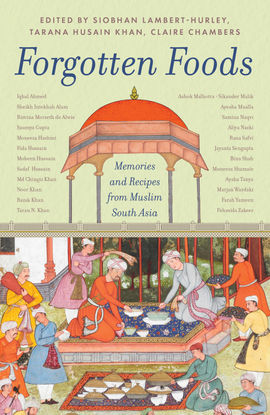
Forgotten Foods
Synopsis
A hearty new anthology from the makers of Desi Delicacies celebrating the lesser-known cuisines of Muslim South Asia.
While heritage foods still abound in the streets and kitchens of South Asia, it may just be a matter of time before many of these historic dishes and culinary traditions, especially of Muslim provenance, pass into oblivion. In Forgotten Foods, historians, literary scholars, plant scientists, heritage practitioners, writers and chefs come together to document precious stories and memories, histories and recipes in a valiant endeavour to stem this lamentable tide.
Introducing us to the legendary poet Faiz Ahmed Faiz’s modest, homely tastes, his daughter Moneeza Hashmi draws our attention to dishes that continue to cut across the seemingly impermeable India–Pakistan border. In Sri Lanka, Rizvina Morseth de Alwis finds comfort in the ‘strange’ recipes of her country’s Malay cuisine. A lost kitchen cabinet in Bhopal holds the secret behind the tenderest shami kababs. A journey through the rich foodscape of Manipur’s Pangal community depicts its close ties to the dietary traditions of marginalised groups. Tarana Husain Khan visits Rampur’s paddy fields on a quest for heritage rice varieties, even as we experience the sweeter side of Hyderabad’s cuisine generally notorious for its heat. A cornucopia of other essays familiarise us with uncommon items such as Kerala’s jeeraga kanhi, Kashmir’s saada saag and the delicate murgh qorma of Awadh.
The culinary diversity showcased in Forgotten Foods not only comes as a delightful surprise, it also proves just how profoundly Muslim kitchens have reshaped alimentary practices, enriching South Asian food and making it what it is today.
Details
Reviews
‘Forgotten Foods stitches personal narratives, history and recipes to spotlight the foodways of Muslims in South Asia. At a time when war, religious conflict and food bans are becoming common, a book about Muslim kitchens serves as a tangential tool to understand a community and how they shaped world history. Themes of displacement, migration and food as emotional nourishment underpin the anthology (which also) includes subaltern narratives from home kitchens, cookbooks and the diaspora community’
Jahnabee Borah, Mint Lounge
‘There are all kinds of food books. Some are a collection of recipes, others are autobiographical and some claim to be rewriting the history of what we eat … Rarely does one come across a volume that blends all these ingredients beautifully to present a delicious dish, but this anthology is a rare exception.’
Pushpesh Pant, Tribune
‘(Forgotten Foods attempts to draw) attention to not only the plurality of South Asian Muslim foodways but also the context that must be provided while studying the politics of identity, displacement, migration, religion, caste and class through the lens of food.’
Jehan Nizar, Vogue India
'The best aspect of the book is that along with the rich information and histories it lays out, it also doubles as a no-nonsense cookbook.'
Ruchir Joshi, India Today
'Emerges not only as a treasure trove of fast-fading heritage recipes but also as a symbol of affirmation of communities under threat as well as an act of resistance against the annihilation of identities'
Ishita Mukherjee, Telegraph India
'A portmanteau of stories that transform food from being an urgent necessity into a way of life and portal to nostalgia'
Mallik Thatipalli, Slurrp
